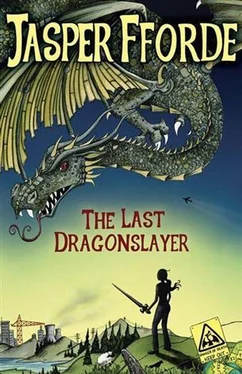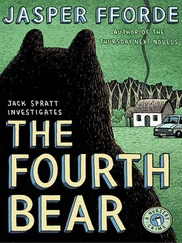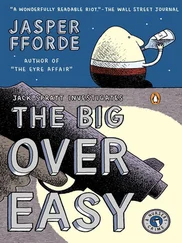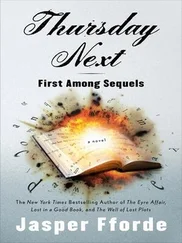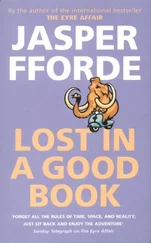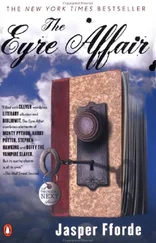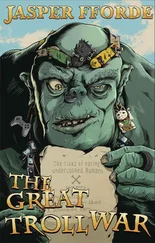‘The Mighty Shandar?’
‘Have I told you this story before?’
Mother Zenobia was suspicious that I was humouring an old person with a flaky memory; she would have narrowed her eyes if she had any.
‘Not at all. It’s just that the sorcerers back at Zambini Towers often speak of him.’
‘He is the yardstick for magicians everywhere,’ replied Mother Zenobia solemnly. ‘That is why we measure magical power in Shandars.’
Making a toad burp requires about two hundred Shandars; boiling an egg can use over a thousand. My own power had been rated at 159.3, which is not far from the national average of 150, which gives you a good idea of how bad I was at it.
‘Where were we?’ asked Mother Zenobia, who had lost track of the conversation.
‘You were telling me about the Mighty Shandar.’
‘Oh yes. No one knew where he came from, nobody knew where he went, and few people even know what he looked like or what he liked to eat. But in one respect everyone was agreed: the Mighty Shandar was the most powerful mage the planet had ever known. Greater than Mu’shad Waseed, the Persian wizard who could command the winds, more powerful than Garance de Povoire, the French wizard of Bayeux, or even Angus McFerguson, the Scottish sorcerer who made the Isle of Wight a floating isle, which could be towed by tugs to the Azores for the winter, and to the best of my knowledge, still is.’
‘I think they have engines attached to it now,’ I mentioned, as Mother Zenobia rarely kept up with the times. ‘Did... did the Mighty Shandar have an agent?’
‘History does not record one. Why do you ask?’
‘No reason. What happened next?’
She paused for thought and took another sip of tea.
‘It was in June 1591. As soon as the Mighty Shandar arrived in England, he decided to demonstrate his awesome powers and promptly built the Great Castle at Snodhill, which has housed the ruling Kings of Hereford ever since. He sat in his castle and waited for the word to spread. And spread it did. Within a week ambassadors from the then seventy-eight different kingdoms of Britain descended on the Great Palace, all to offer him employment. The point was this: the most powerful kingdom in those days before the invention of modern weapons was the kingdom with the most powerful wizard. But the Mighty Shandar was not a man to side with the most wealthy or help the bullies overcome the cissies. No, he told the assembled ambassadors that he would work for none of them, but all of them. So the seventy-eight ambassadors went away and had consultations with their leaders and one another and reported back to the Mighty Shandar that the greatest thing he could do would be to deal with the Dragon Question. Shandar put his great fingers to his great forehead and thought great thoughts; he agreed to the great task but because of the great difficulty and the great amount of time it would take, he would require a great deal of money; eighteen dray-weights (a common system of measurement at that time) of gold.
‘“ Eighteen dray-weights of gold? ” the ambassadors said to one another, shocked at so high a price. “Are you nuts? Mu’shad Waseed offered to rid us of the Dragons for only seven dray-weights!”’
‘The Mighty Shandar definitely had an agent,’ I said with a smile, forgetting I wasn’t to interrupt, ‘and better than Mu’shad Waseed’s.’
‘Didn’t I tell you not to interrupt?’
‘Sorry.’
Mother Zenobia continued.
‘“But Mu’shad Waseed,” replied Shandar in answer to the ambassadors, “fine magician as he is, does not have in his entire body one hundredth the power I have in my smallest toe.”
‘“I heard that!” said Mu’shad Waseed, throwing off his disguise and stepping forward. He had secretly arrived at Shandar’s palace the day before, having heard of Shandar’s demands. “Let’s see this mighty toe of yours!”
‘But instead of showing Mu’shad Waseed his toe, the Mighty Shandar bowed low, so low in fact that his forehead touched the ground, and he said, in a voice toned deep with respect and reverence:
‘“Welcome to my humble palace, most noble Wizard of the Persian Empire, controller of the winds and tides and known locally as He who can quell the Tamsin .”’
‘Don’t you mean Khamsin?’ I asked. ‘The hot and dusty wind that blows through the Arabian peninsula?’
‘If I meant Khamsin I would have said Khamsin,’ replied Mother Zenobia, beginning to get annoyed. ‘Tamsin was Mu’shad Waseed’s second wife. Frightful, frightful woman. Her love of glittery things, fine robes and bathing in rabbit’s milk set feminism back four centuries. And since you interrupted again, I’m going to ask Sister Assumpta to finish the story.’
‘Please don’t.’
Personally, I liked Sister Assumpta, but she had an annoying habit of telling stories using cricket as a metaphor. I’d be hearing the story in the context of a match, with the knights using the Mighty Shandar as their last man in, and fifty to make in failing light.
‘Very well,’ said Mother Zenobia, who didn’t like cricket metaphors either. ‘Last chance.’
‘“Great Mu’shad Waseed,” continued Shandar, “I read of your work in Sorcerers Monthly . Your control of the thunderstorm and the winds is quite awe-inspiring.”
‘But Mu’shad Waseed, who was the combustible product of a Persian father and a Welsh mother, was too angry to return Shandar’s politeness and instead caused a massive rainstorm to move in from the west, and as all the ambassadors of the seventy-eight kingdoms of the Ununited Kingdoms ran for cover, Mu’shad Waseed and Shandar faced each other. Their eyes narrowed and a Super Grand Master Sorcerers’ contest seemed ready to begin. But Shandar, whose turn it was by the sorcerer’s code to begin the contest, did nothing.
‘“Very well,” said Shandar slowly, a smile gathering on his lips, “you may deal with the Dragon Question. I shall return when you fail.” And so saying, he vanished.
‘Mu’shad Waseed gulped. In reality he knew that he did not have the power of the Mighty Shandar; when he had built a castle in Alexandria it had taken him not one night, but a month, and although he had, on occasion, built palaces in a lunch break, none of them had included—as Shandar’s had—a four-acre heated swimming pool, a library containing every book ever published and a zoo that apart from most of the world’s animals, also included a few that the Mighty Shandar had made up himself.
‘Whoops, thought Mu’shad Waseed, as the seventy-eight ambassadors of the Ununited Kingdoms emerged from their carriages wearing raincoats and galoshes, eager to know how Mu’shad Waseed was going to deal with the Dragon Question.’
‘Despite his own misgivings, Mu’shad Waseed accepted the task and threw himself into the project heartily. His first act was to ship many of his fellow wizards from Persia to act as a working committee, as it was a well-known fact that Dragons could do magic too, and that any spell woven by Mu’shad Waseed could just as easily be unwoven by Janus, Mr Beezley or even Dimwiddy. The best that Mu’shad Waseed could manage was the instigation of a class of warriors known as the Dragonslayers, men and women who were bold in heart and soft in the head, who would be sworn into the service after a five-year apprenticeship. Mu’shad Waseed created suits of armour with copper spikes, sharpened by the strongest magic to a point that could cut through anything. To each Dragonslayer he gave a horse blessed with intelligence and courage, and finally a sword and a lance, both of which were made of the finest steel, forged in the fires of the volcanoes of Tierra del Fuego, kept hot and then quenched in the lakes of Alaska—all fairly routine stuff.
Читать дальше
